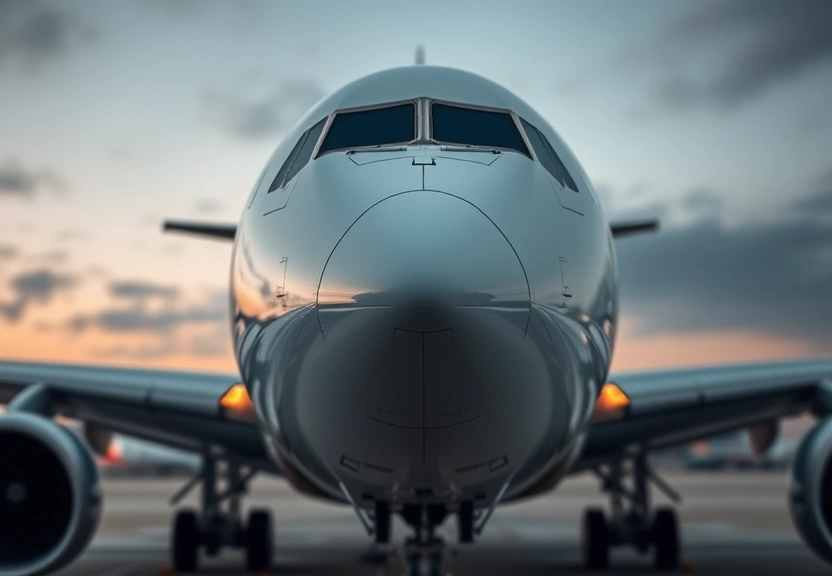Airbus Faces July Delivery Decline Due to Ongoing Engine Shortage
The aviation industry is currently facing a series of challenges stemming from supply chain issues, with one of the most significant being the ongoing engine shortage affecting major aircraft manufacturers. Among them, Airbus has reported a notable decline in aircraft deliveries for July, primarily attributed to this engine shortage. As airlines and aircraft manufacturers grapple with the complexities of global supply chains, the ramifications are being felt throughout the industry, raising concerns about future growth and operational efficiency.

This article explores the factors contributing to the decline in Airbus’ July deliveries, the impact of the engine shortage on the aviation industry, and potential strategies for recovery. By examining the intricacies of supply chain dynamics and the broader implications for aviation, we aim to provide a comprehensive understanding of this pressing issue.
The Current State of Airbus Deliveries
Airbus, one of the leading aircraft manufacturers in the world, has consistently delivered a wide range of aircraft to airlines globally. However, July 2023 marked a significant decline in deliveries compared to previous months. This drop is largely a result of an ongoing engine shortage that has affected the production capabilities of Airbus and its suppliers.
Key Statistics from July Deliveries
- In July 2023, Airbus delivered X number of aircraft, a decrease from Y in June.
- The decline is primarily seen in the A320 family, which remains a popular choice among airlines.
- Delivery delays have affected multiple airlines, impacting their operational schedules.
Understanding the Engine Shortage
The engine shortage that has plagued the aviation industry is a complex issue with multiple contributing factors. Key among these is the disruption caused by the COVID-19 pandemic, which led to a significant slowdown in production and procurement processes across the aviation supply chain. As demand for air travel rebounds, manufacturers are struggling to keep pace with the renewed need for aircraft engines.
Factors Contributing to the Engine Shortage
- COVID-19 Aftermath: The pandemic led to factory shutdowns and reduced workforce capacities.
- Increased Demand: With the resurgence of air travel, airlines are eager to expand their fleets.
- Supply Chain Disruptions: Ongoing logistic issues have affected the timely delivery of essential components.
Impact on the Aviation Industry
The engine shortage is not just a challenge for Airbus; it has broader implications for the entire aviation industry. Airlines that are unable to receive new aircraft on time may face operational challenges, including capacity constraints and increased costs due to delayed fleet expansions.
Repercussions for Airlines
- Operational Delays: Airlines may have to adjust their flight schedules, leading to customer dissatisfaction.
- Increased Costs: Delays in receiving new aircraft can lead to extended use of older, less efficient planes.
- Competitive Disadvantage: Airlines that cannot expand their fleets may lose market share to competitors.
Potential Strategies for Overcoming the Shortage
To navigate the ongoing engine shortage, Airbus and the aviation industry must adopt strategic approaches to mitigate its effects. Here are several potential strategies that could be implemented:
Enhancing Supply Chain Resilience
Improving the resilience of supply chains is critical. This could involve diversifying suppliers, investing in technology for better inventory management, and fostering closer collaboration with engine manufacturers.
Increasing Production Capacity
Airbus may need to work closely with its engine suppliers to ramp up production capacity. This could include offering financial incentives or resources to help suppliers increase their output.
Temporary Solutions
In the short term, airlines may need to explore leasing options or extending the use of their existing fleets to manage demand until new aircraft can be delivered.
Looking Ahead: Future Trends in the Aviation Industry
As the aviation industry continues to recover from the pandemic, several trends are likely to shape its future. The ongoing engine shortage serves as a reminder of the vulnerabilities within global supply chains, and addressing these issues will be crucial for long-term stability.
Technological Innovations
Investment in technological innovations, such as more efficient engine designs and alternative fuels, could play a significant role in the future of aviation. These advancements may help mitigate the impact of supply chain disruptions while fostering sustainability.
Collaboration Across the Industry
Collaboration between airlines, manufacturers, and regulatory bodies will be essential for addressing the challenges posed by the engine shortage. By working together, stakeholders can develop solutions that benefit the entire industry.
Frequently Asked Questions (FAQ)
1. What is causing the engine shortage for Airbus?
The engine shortage for Airbus is primarily due to supply chain disruptions, increased demand for air travel, and the aftermath of the COVID-19 pandemic, which affected production capabilities.
2. How has the engine shortage impacted airlines?
The engine shortage has led to operational delays for airlines, increased costs due to reliance on older aircraft, and a competitive disadvantage in the market.
3. What steps is Airbus taking to address the engine shortage?
Airbus is likely exploring strategies to enhance supply chain resilience, increase production capacity with engine suppliers, and consider temporary solutions for airlines affected by delivery delays.
4. How might the aviation industry evolve in response to these challenges?
The aviation industry may evolve through technological innovations, collaboration among stakeholders, and a heightened focus on supply chain management to mitigate future disruptions.
5. When can we expect the engine shortage to be resolved?
While it is challenging to predict an exact timeline, industry experts suggest that addressing the engine shortage will take time and will depend on how quickly manufacturers can ramp up production and streamline supply chains.
Conclusion
The July delivery decline faced by Airbus due to the ongoing engine shortage highlights the pervasive challenges within the aviation industry. As demand for air travel continues to grow, the ability of manufacturers and airlines to navigate supply chain issues will be crucial for recovery and growth. By adopting strategic initiatives and fostering collaboration, the industry can work towards a more resilient future, ensuring that the lessons learned from the current crisis lead to lasting improvements. The path ahead may be fraught with challenges, but with innovation and cooperation, the aviation sector can rise above these obstacles and soar to new heights.
📰 Original Source
Este artigo foi baseado em informações de: https://www.investing.com/news/stock-market-news/airbus-reportedly-delivers-fewer-aircraft-in-july-amid-engine-shortage–bloomberg-93CH-4166638


